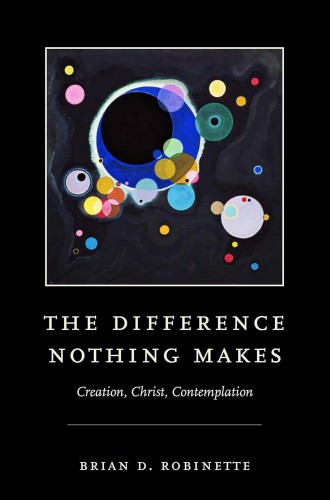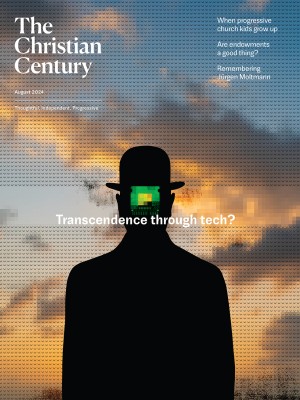Everything from nothing
Theologian Brian Robinette argues that the beleaguered doctrine of creatio ex nihilo is both important and practical.

The Difference Nothing Makes
Christ, Creation, Contemplation
Eighteen centuries on, the doctrine that God creates from nothing (creatio ex nihilo) still breeds bafflement and objections. The philosophical theologian John D. Caputo, for example, worries that this teaching funds a pernicious, ideologized picture of God as the Big Other—capricious, aloof, and domineering—whose creative fiat runs roughshod over creaturely freedom; a chastened “weak God” hypothesis, Caputo counters, better helps believers embrace dynamic biblical narratives and confront the problem of evil.
On the contrary, argues Brian Robinette, critics of creatio ex nihilo, both ancient and contemporary, have missed the mark. In a bold, sweeping, and masterful new book, the Boston College theologian defends and constructively retrieves this often beleaguered doctrine. He argues that the God who communicates Godself without reserve in the life, death, and resurrection of Jesus Christ is the One who brings everything—being, life, communion, and wonder—from nothing. This doctrine, when rightly deployed, fosters lives of prayerful gratitude, joyful self-abandonment, and abiding hope in the face of suffering and death. Creatio ex nihilo, Robinette contends, is no abstract, speculative claim about when and how the world began. It is, rather, a profoundly practical teaching that can inform and inspire projects of nonviolence, ecological renewal, and non-defensive engagements with contemporary thought and culture. Robinette writes: “As challenging as it may be for us to imagine, the world we typically take for granted, the only world we actually know, is wholly gratuitous, without necessary existence, and utterly dependent upon an unfathomable God for its very being.”
Read our latest issue or browse back issues.
Creatio ex nihilo, in Robinette’s interpretation, embeds positive claims about the loving compassion of God and the goodness of creation within a series of uncompromising negations. The Creator is no being, not even the highest being, but relates, freely and compassionately, to God’s creatures in ways that are non-dualistic, non-oppositional, and non-contrastive (Kathryn Tanner’s term). As the apophatic, mystical theologian Pseudo-Dionysius taught, even the notion of “being” itself misleads. God is not the upper pole on a spectrum of existence; between Creator and creation lies no intermediary or demiurge (contra the ancient Gnostics and Middle Platonists). Paradoxically, though, only the God who grounds and transcends finite existence utterly is free to enter creation freely, fully, agapically, and pacifically as a creature, Jesus Christ.
Belief in creation’s gratuity, Robinette argues, naturally coheres with an intellectual and practical commitment to nonviolence.
Indeed, argues Robinette (drawing heavily upon Karl Rahner), creation itself is a process of divine self-communication that comes to fruition in the life, death, and resurrection of Jesus, whose utter filial dependence upon the first person of the Trinity realizes the perfection of human freedom. Paradoxically, in a fundamentally mysterious manner, God in Christ empties Godself, without yielding the prerogatives of deity and without abrogating the Creator-creature distinction. Although, Robinette maintains, creatio ex nihilo may not necessarily be taught explicitly in scripture, Christian apologists in the second and third centuries—notably, Irenaeus, Tertullian, and Theophilus of Antioch—fittingly elaborated the implications of biblical narratives of creation, covenant, and redemption within an ancient philosophical milieu.
The nihil out of which God creates is no-thing, neither unformed matter nor even the potentiality for existence; rather, it names a limit concept that gestures to the inexplicable giftedness, and thus sheer blessedness, of creaturely existence. The One who transcends me utterly, Augustine taught, is closer to me than I am even to myself. Nor does this nihil represent some sort of lack within the divine life needing to be filled in the act of creation. Still, drawing upon the Russian thinker Sergei Bulgakov, Robinette writes that we might say that God “needs” the created world, not for God’s sake but for the world’s own sake. As the divine life is essentially self-diffusive and self-
donational, it is fitting and proper (necessary even?) for God to establish the creaturely other. These paradoxical claims, he admits, border on incoherence. Such is the inexplicable reality of the God-world communion.
Though creatio ex nihilo may be an intellectually freighted teaching, Robinette insists that its import is eminently practical. Grappling existentially with the giftedness of existence helps inform and inspire the practice of contemplative prayer, in which one learns to release defensive possessiveness and embrace, in loving trust, sheer dependency upon a Creator and Redeemer who is not a rival. As Sarah Coakley argues, the act of unknowing and self-effacement of the contemplative life is the very expression, not the dissolution, of free agency. Such a praxis of prayer, as Thomas Merton taught, does not entail disengaging from the struggles of contemporary society and politics; rather, the contemplative must wrestle—non-defensively, yet not uncritically—with the challenges of modern nihilism. Apophatic spirituality can be seen as a more mature, even more radical form of the salutary iconoclastic impulse that drives modern atheisms—a stance which, rightly used, can help purge theology of idolatrous views of God.
Moreover, belief in creation’s gratuity, Robinette argues, naturally coheres with an intellectual and practical commitment to nonviolence: “God is revealed as the One whose self-emptying love enters into the depths of rivalry, conflict, and violence in order to overcome them.” God in Christ kenotically endures the wounds of sin and domination without being subsumed by them. In conversation with René Girard and James Alison, Robinette claims that the death and resurrection of Jesus break the mimetic cycle of sacred violence and retribution that has bedeviled human history. Rejecting traditional theories of atonement that construe Christ’s death as a sacrifice assuaging a wrathful Father’s wounded honor, he endorses this Girardian view instead. Set against the background of a world dominated by warring principalities and powers, the cross and resurrection can appear only as paradoxical, a nonviolent victory that unmasks and voids the idolatries of empire, domination, and acquisition.
One might question whether Robinette has accounted adequately for the sense in which resurrection is not only the affirmation of life but the disruptive negation and reversal of entrenched, death-dealing powers—a counterclaim that surely informs the often agonistic, even violent language permeating much of scripture and Christian tradition. Nonetheless, Robinette’s irenic and thought-provoking work can help scholars, pastors, and other educated readers rediscover and retrieve creation theology for today. Precisely in such a world as ours, overshadowed by war, myriad injustices, and immanent ecological catastrophe, believers may echo philosopher William Desmond’s reaffirmation of creation’s giftedness in rearticulating the perennial question: Why is there anything at all?






